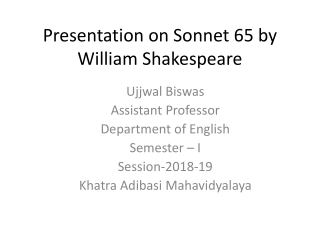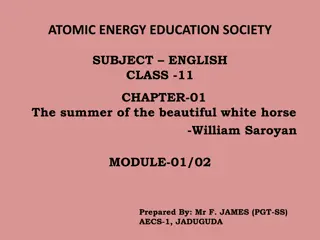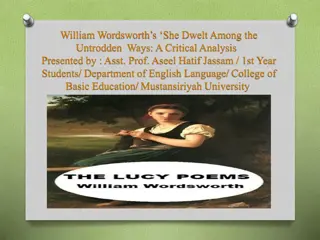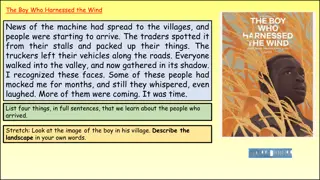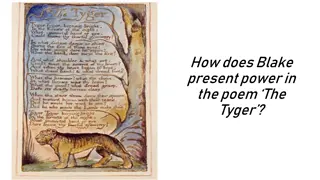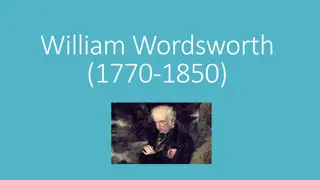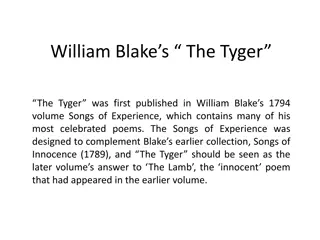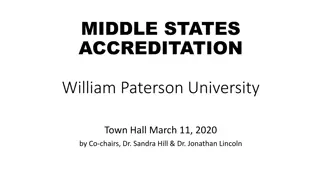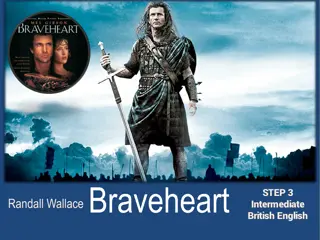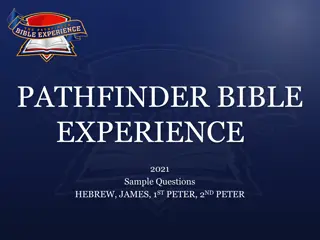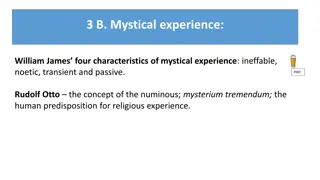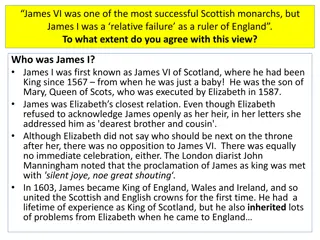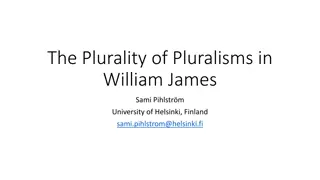Analysis of Sonnet 65 by William Shakespeare
Sonnet 65 by William Shakespeare explores the theme of Time as a powerful force that defies all earthly materials. The poet contemplates how beauty, no matter how strong, will ultimately succumb to Time's relentless passage. The sonnet delves into the idea of immortality through poetry, suggesting t
0 views • 6 slides
Survival and Struggle: William Strachey's Account of The Tempest
William Strachey, a member of the Virginia Company, recounts the harrowing shipwreck of the Sea Venture on the Bermuda island in a storm. Despite mutiny attempts, survivors endured almost a year before reaching safety. Explore the challenges they faced and the possible influence on Shakespeare's pla
0 views • 10 slides
The Summer of the Beautiful White Horse - William Saroyan: Chapter 1 Summary
Two poor Armenian boys, close friends and cousins, encounter a beautiful white horse that fulfills their dream of riding. However, suspicions arise about the horse's origins, leading to questions about honesty and family reputation in this engaging narrative by William Saroyan.
4 views • 9 slides
Poets Through Time: A Glimpse into Literary Legends
Explore the lives and works of renowned poets such as William Shakespeare, William Blake, Robbie Burns, Edgar Allan Poe, Emily Dickinson, Robert Frost, and T. S. Eliot. From Shakespeare's timeless plays to Blake's mystical artistry and Poe's haunting tales, delve into the diverse realms of poetry an
0 views • 11 slides
Overcoming Fear of Water: The Story of William Orville Douglas
William Orville Douglas, a renowned American jurist and politician, shares his childhood experience of nearly drowning and overcoming his fear of water in this excerpt from his autobiography. Despite his initial apprehension, with determination and some help, he conquered his fear and learned to swi
0 views • 16 slides
Analysis of William Wordsworth's "She Dwelt Among the Untrodden Ways
William Wordsworth's poem "She Dwelt Among the Untrodden Ways" from the Lucy series explores themes of loneliness, beauty, and death through simple language and elegiac tone. The poem juxtaposes the beauty of nature with the mysterious and distant character of Lucy, symbolizing unrequited love and l
0 views • 8 slides
The Boy Who Harnessed the Wind: A Story of Innovation and Perseverance
In rural Malawi, a young boy named William Kamkwamba builds a windmill out of scraps to save his village from drought and famine. Despite facing skepticism and challenges, William's determination leads to success, educational opportunities, and hope for his community's future.
1 views • 7 slides
Selection of Poems by Shelley, Blake, Browning, Wordsworth, Tennyson, Owen, and Heaney
A diverse collection of poems by renowned poets such as Percy Bysshe Shelley, William Blake, Robert Browning, William Wordsworth, Alfred Lord Tennyson, Wilfred Owen, and Seamus Heaney. Each poem delves into different themes and emotions, showcasing the beauty and power of poetry through vivid imager
2 views • 15 slides
Reflecting on William Martin School Memories
It's that time of year when memories at William Martin School are shared and reflected upon. Students are encouraged to write and film their favorite memories to create a heartfelt leavers service. Mind maps and writing prompts help students organize their thoughts by year group, leading to a collec
0 views • 6 slides
Analyzing Power in William Blake's Poem "The Tyger
Explores how William Blake presents power through the depiction of the fierce and beautiful tiger in his poem "The Tyger." The analysis delves into the imagery, symbolism, and awe-inspiring nature of the tiger, emphasizing the concept of divine creation and the duality of existence.
1 views • 14 slides
William Wordsworth (1770-1850): Poet of Nature and Memory
William Wordsworth, a renowned English poet, was born in 1770 and his works were inspired by the landscapes of the Lake District. His collaboration with Coleridge in publishing "Lyrical Ballads" marked a significant moment in Romantic poetry. Wordsworth's emphasis on simplicity, nature, memory, and
1 views • 7 slides
Exploring "The Tyger" by William Blake: An Insight into the Poet's Vision
William Blake, a visionary poet and artist, crafted "The Tyger" as a thought-provoking piece questioning the nature of creation and the duality of existence. Through rhetorical questions and literary devices, Blake delves into the mystery of the fierce beast and reflects on themes of divine power an
0 views • 7 slides
Unveiling the Authorship of the Book of James
Exploring the intricate discussion on the authorship of the Book of James, this analysis delves into the identities of various James figures in scripture, highlighting the significance of understanding the writer's context and background.
0 views • 19 slides
The Influence of William Congreve on Restoration Comedy
William Congreve, an English playwright and poet of the Restoration period, is known for his clever and satirical dialogue that influenced the comedy of manners style. The Restoration period marked the end of Cromwell's Commonwealth and the return of monarchy with Charles II. Comedy of manners refle
0 views • 10 slides
Analysis of William Blake's Poem "The Tyger
The poem "The Tyger" by William Blake, published in his 1794 volume, Songs of Experience, contrasts with his earlier work, "The Lamb." It delves into the creation of the fearsome tiger, questioning the divine creator and the symbol of fire, strength, and danger conveyed by the tiger. The speaker won
0 views • 9 slides
Critical Appreciation of William Blake's Poem 'The School Boy' - Lesson 3
Learners will delve into the critical appreciation of William Blake's poem 'The School Boy' in Unit 5, Lesson 3. The lesson entails an elaborate discussion about the poem, offering essential information about the poet, and preparing students for examinations. The poem reflects on the contrast betwee
0 views • 15 slides
The Romantic Poet William Wordsworth: Life, Works, and Influence
William Wordsworth, a prominent Romantic poet, was known for his connection to nature, emphasis on individualism, and rejection of industrialization. This summary discusses his life, notable works like "Lyrical Ballads," and his impact on the Romantic Movement.
1 views • 18 slides
The Journey to Abolishing Slavery: Understanding William Wilberforce & the Movement
Discover the historical context of slavery, the pivotal role of William Wilberforce, and the reasons behind Britain's decision to abolish the slave trade in 1807. Explore key events, debates, and societal shifts that led to the abolition movement, shedding light on the complexities and motivations i
0 views • 9 slides
Analysis of "The School Boy" by William Blake
In William Blake's poem "The School Boy," a young boy expresses his unhappiness with school, longing for freedom and nature. He resents the joyless lessons and yearns for a life outdoors. The poem highlights the contrast between the boy's desire for joy and freedom with the confinement and sorrow of
0 views • 11 slides
Life and Legacy of James Armistead Lafayette: A Patriot Spy
James Armistead Lafayette, born into slavery in 1748, became a pivotal figure in the American Revolution as a double spy for the patriots. His daring espionage efforts on both the American and British sides helped secure American victory. Despite his challenging early life, he emerged as a symbol of
1 views • 7 slides
The Remarkable Story of William Henry Lynch: Gallipoli Hero
Born in Wellington in 1895, William Henry Lynch enlisted in the army in 1914, embarking on a journey from New Zealand to Gallipoli, where he tragically lost his life in the Battle of Chunuk Bair in 1915. Despite dental issues, Lynch fought with valor as part of the Wellington Mounted Rifles, represe
0 views • 10 slides
Enhancing Sports and Physical Education at St. James: A Look at the 2014-2015 Initiatives
Discover how St. James utilized the sports budget for 2014-2015 to improve PE provision, offer extra-curricular opportunities, enhance staff training, and invest in new equipment. The PE Premium was allocated towards various aspects such as new equipment, outside coaches, staff development, and scho
0 views • 9 slides
The Succession Crisis of 1066: An Overview
England in the 11th century faced a succession crisis in 1066 due to a lack of clear rules for the throne. Edward the Confessor's weak rule led to competing claims from Harold Godwinson, William of Normandy, Edgar Aetheling, and Harald Hardrada. The Battle of Hastings in 1066 saw Harold's defeat by
0 views • 4 slides
William Paterson University Middle States Accreditation Progress Report
The Middle States Accreditation process at William Paterson University is progressing smoothly, with activities including self-study drafting, community feedback, and campus labs utilization for assessment training. The timeline involves drafting three stages, culminating in submission to the MSCHE
0 views • 9 slides
The Epistle of James: Exhortation to Genuine Faith and Love
The Epistle of James addresses the need for genuine, working faith among Jewish Christians, emphasizing the importance of loving one another and avoiding divisions based on wealth, pride, and prejudice. James encourages believers to persevere through trials, which can produce character and deepen th
0 views • 21 slides
The Epistle of James: Encouraging Genuine Faith and Unity among Jewish Christians
The Epistle of James delves into how Jewish Christians faced trials testing their faith and unity, emphasizing the need for genuine working faith over mere conviction. James also highlights the dangers of wealth, pride, prejudice, and hypocrisy among believers, urging repentance and unity. Through v
0 views • 20 slides
Braveheart: The Beginning of a Young Hero's Journey
In the year 1276, a young Scottish boy named William Wallace witnesses a brutal massacre that changes his life forever. With his father and brother slain, William is left with a burning desire for revenge against the English. Guided by his uncle, William begins his journey towards becoming a legenda
0 views • 53 slides
Pathfinder Bible Experience 2021 Sample Questions on Hebrews, James, 1st Peter, 2nd Peter
Explore sample questions from the Pathfinder Bible Experience 2021 on the books of Hebrews, James, 1st Peter, and 2nd Peter. Test your knowledge on key verses and concepts from these biblical texts. Challenge yourself with questions on the death of Jesus, the better covenant, inquiries by prophets,
0 views • 65 slides
History and Supernatural Intrigues Surrounding Macbeth and King James I
Macbeth, written around 1606 to honor King James I's ascension, drew inspiration from Scottish history and set in 11th century Scotland. King James I's rule in Scotland and England, marriage to Anne of Denmark, and encounters with the supernatural, including witchcraft accusations, are intriguing fa
0 views • 21 slides
Mystical Experience and the Numinous: William James and Rudolf Otto
William James identified four characteristics of mystical experiences as ineffable, noetic, transient, and passive. Rudolf Otto introduced the concept of the numinous, encompassing the mysterium tremendum, emphasizing the human propensity for religious encounters. The numinous experience is describe
0 views • 11 slides
Legacy of James Bond: 60 Years, 27 Films, and Countless Adventures
James Bond, the iconic British spy character, has been portrayed by various actors over the past 60 years in a total of 27 films. From Sean Connery to Daniel Craig, the character has evolved while maintaining his charm and mystery. The latest film, "No Time to Die," continues the legacy with action-
0 views • 11 slides
Philosophers' Views on Religious Experience: Insights from William James
Explore William James' perspective on religious experiences, including his views on existential and value judgments. Understand how James argued for the validity of religious experiences and their potential proof of God's existence. Delve into the implications of emotions and prior beliefs on interp
0 views • 7 slides
Factors Behind William's Victory at the Battle of Hastings
In 1066, William of Normandy triumphed at the Battle of Hastings due to a combination of his strengths, Harold's weaknesses, and other factors. This victory was attributed to various strategic decisions, military tactics, and William's determination to claim the English throne. The battle marked a s
0 views • 10 slides
Stunning Slides Featuring James' Portraits
Exquisite collection of visually captivating slides showcasing different perspectives and moods of James. Each slide highlights a unique aspect of James' persona captured in high-quality images.
0 views • 18 slides
William of Normandy and the Domesday Book: A Lesson in Governance
Explore the reign of William of Normandy and the significance of the Domesday Book in understanding his methods of control. Dive into the challenges faced by William's commissioners as they gather information on land ownership across England and analyze the patterns emerging from the collected data
0 views • 8 slides
Stunning Images of James
Experience a collection of beautiful images featuring James. From captivating portraits to scenic shots, explore the essence of James in different settings. Each image tells a unique story, inviting you to delve into the world of James through a visual journey.
0 views • 14 slides
Analyzing the Reign of James I of England: Success or Failure?
James VI of Scotland, also known as James I of England, faced challenges when inheriting the English throne from Elizabeth. Despite his experience ruling Scotland, he encountered difficulties in England. Participants in a decision-making game assess James I's actions and compare them to ideal respon
0 views • 25 slides
The Epistle of James: Bridle Your Tongue
The Epistle of James, James 1:19-26 NKJV, emphasizes the importance of being slow to speak, quick to listen, and slow to anger. It encourages believers to not only hear but also act upon the word of God, warning against self-deception and emphasizing the significance of controlling one's speech to a
0 views • 17 slides
The Plurality of Pluralisms in William James
William James presents various forms of pluralism in his philosophical works, encompassing metaphysical, epistemological, ethical, metaphilosophical, and religious perspectives. He contrasts pluralism with monism and advocates for a more empirical approach. James's ideas challenge conventional monis
0 views • 12 slides
The Epistle of James: Bridle Your Tongue
The Epistle of James, specifically James 1:19-26 from the NKJV, emphasizes the importance of being slow to speak, quick to listen, and slow to anger. It teaches to rid oneself of wickedness, receive the Word with meekness, and act upon it to avoid self-deception. The passage warns against being only
0 views • 30 slides
